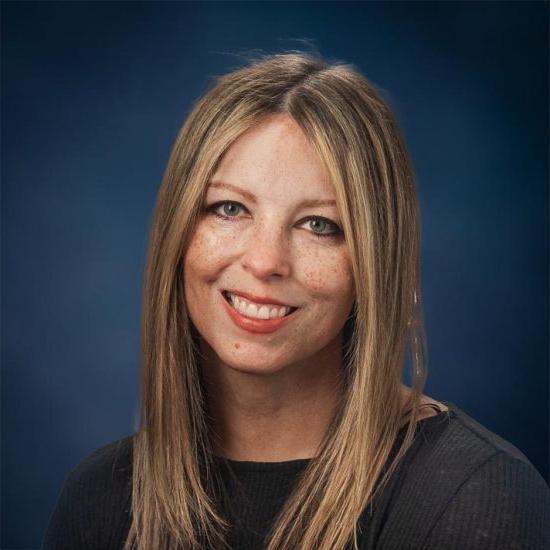Even your hardest day in special education is filled with meaning. Driving home each day, you know that your work made a difference.
Belinda Rudinger, Ed.D., ATP, CATIS Assistant Professor
- Faculty

From the moment she set foot on a university campus as a freshman, Belinda Rudinger, Ed.D., knew she wanted to work in higher education. After earning her bachelor’s degree in literature with plans for graduate work in second language acquisition, a summer special education position stole her heart and changed her direction. After graduate work in applied behavior analysis, autism intervention, and visual impairments, she served as a teacher, mentor and assistive technology consultant. Special education offered her the chance to work with students from ages 11 months to 21 years, with a range of exceptionalities in various settings.
“Even your hardest day in special education is filled with meaning,” Rudinger said. “Driving home each day, you know that your work made a difference.”
Providing outreach and professional development as a consultant reminded Rudinger of her original calling to work in higher education and prompted her to complete her doctorate. Her path has happily come full circle with the opportunity to serve as an assistant professor at A&M-Commerce.
A Conversation with Dr. Rudinger
What do you like most about your career?
Special education is still a new field with a lot to discover! I love finding ways to synthesize current research into specific actionable steps for new teachers to employ. College can be a tough time for many students as they balance work, personal lives and studies. As a professor, providing care and support during this period of their lives allows me to pay forward how countless educators, students and families have made a difference in my life.
What has been your favorite course to teach?
I love teaching our Low Incidence Disabilities course, because it allows me to focus on two of my favorite topics: braille and assistive technology.
Tell us about an academic project you are working on or recently completed.
In one recent project, I explored the impact of assistive technology on self-determination for individuals with visual impairments. This work involved considering the user experience in the areas of autonomy, competence and relatedness. Overall, my research interests lie in leveraging technology to promote empowerment and connection.
Educational Background
- Certified Assistive Technology Instructional Specialist (CATIS), University of Massachusetts-Boston, 2023
- Ed.D., Educational Sustainability, University of Wisconsin-Stevens Point, 2020
- Assistive Technology Professional (ATP) certification, Rehabilitation Engineering and Assistive Technology Society of North America, 2017
- Certificate in Visual Impairment, Stephen F. Austin State University, 2010
- M.Ed., Special Education, University of North Texas, 2004
- B.A., Literature, University of North Texas, 2001
Academic Positions
- Assistant Professor, Texas A&M University-Commerce
- Clinical Assistant Professor, Texas A&M University-Commerce
Honors and Awards
- Chair Elect, Information and Technology Division of the National Association for the Education and Rehabilitation of the Blind and Visually Impaired, 2024-2026
- Board of Directors, Council for Exceptional Children's Division on Visual Impairments and Deaf-Blindness (DVIDB), 2022-2026
- International Delegate, World Blindness Summit, 2021
- President, Texas Association for the Education and Rehabilitation of the Blind and Visually Impaired, 2020-2023
- Chairperson, International Services and Global Division of the National Association for the Education and Rehabilitation of the Blind and Visually Impaired, 2020-2021
- Sammi K. Rankin award, Texas Association for Education and Rehabilitation of the Blind & Visually Impaired (For “outstanding contribution to services for persons who are blind or visually impaired in Texas”)
- Joy Award, Grand Prairie Independent School District (For demonstrating “integrity, dependability, flexibility, and the ability to show love, laughter, and leadership” according to professional peers)
Research Interests
- Assistive technology
- Digital inclusion and accessibility
- Non-visual access to print and media
- Sustainable provision of braille
Selected Publications
Related News

A&M-Commerce Professional Development Series Helps Employees Grow, Thrive
This spring, Texas A&M University-Commerce embarked on the second semester of its transformative Investing in Us employee development program, which has met with high praise from faculty and staff across the university. The innovative program features eight-week courses designed to help employees learn, grow and thrive in their careers. According to Dr. Carrie Klypchak, senior […]

A&M-Commerce Professor to Learn, Receive Innovative New Braille Device
A&M-Commerce faculty Dr. Belinda Rudinger has been selected to participate in a two-day training on the Monarch,...

A&M-Commerce Special Education Faculty Member Named to Board
Belinda Rudinger, Ed.D., a clinical assistant professor in the Department of Psychology and Special Education at A&a...


